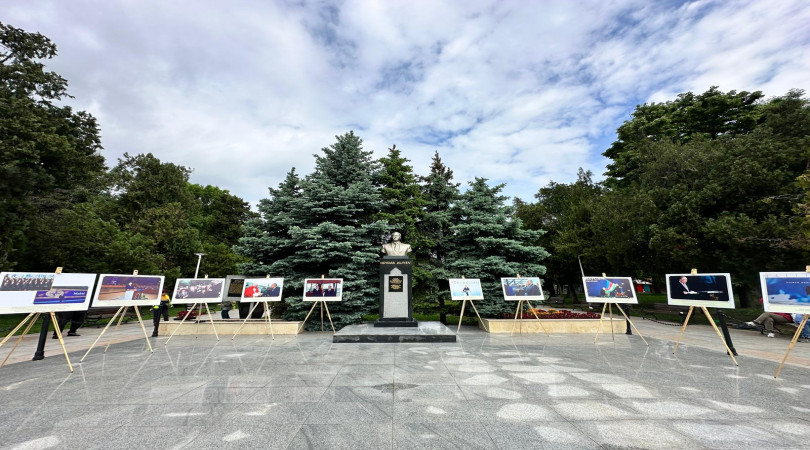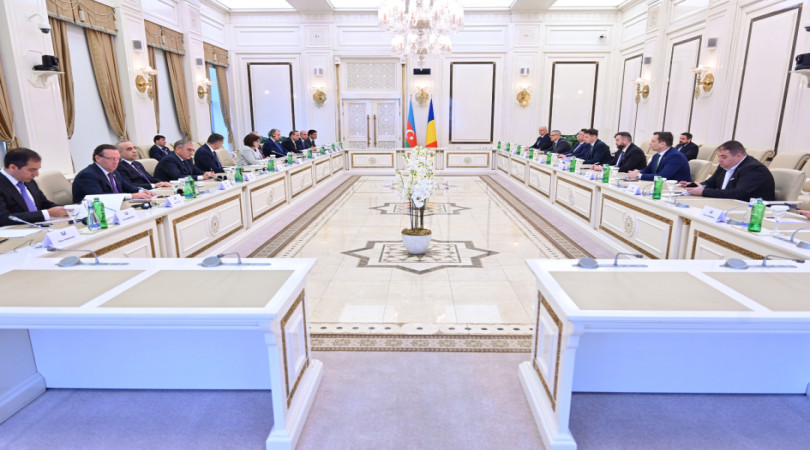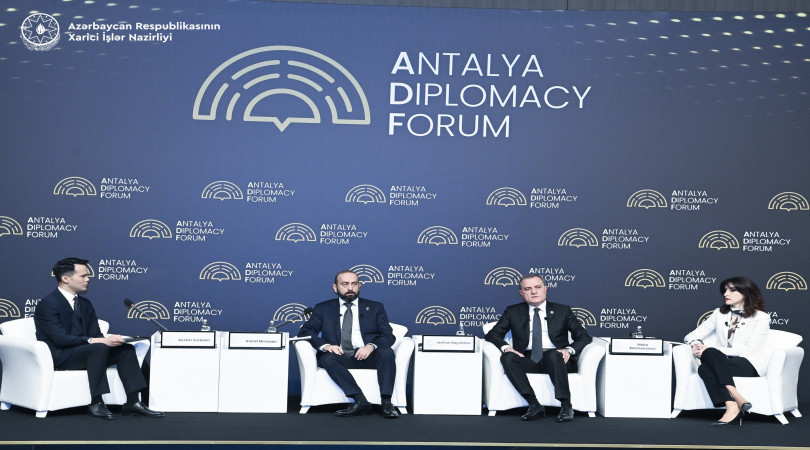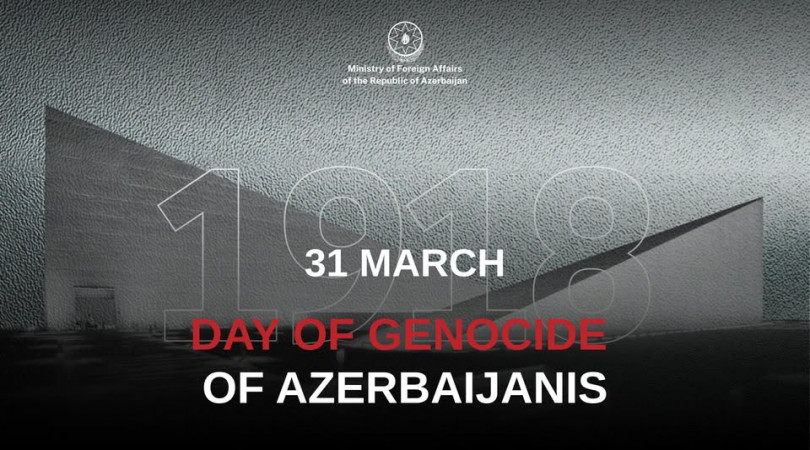8th November - the first anniversary of the Victory Day in the 44-day Patriotic War

More than a year has passed since the beginning of the 44-day Patriotic War, which ended the 30 years Armenian occupations of the internationally recognized territories of the Republic of Azerbaijan and restored the territorial integrity of our state. On September 27, 2020, the Armenian armed forces, in violation of the ceasefire regime, subjected to artillery fire the positions of the Azerbaijani army, as well as several localities along the front line, which resulted in human casualties and injuries among civilian population. In order to stop the attack of the Armenian army and ensure the security of the civilian population, the command of the Azerbaijani army decided to launch a rapid counterattack along the front line. Following the counterattack, the Azerbaijani armed forces managed to suppress Armenia's firing positions in the occupied territories of the Republic of Azerbaijan, and Azerbaijan began to free up its lands in order to restore its territorial integrity. This escalation must be seen in the context of Armenia's military aggression against Azerbaijan between 1991-1994. As a result of this aggression 20% of the territory of the Republic of Azerbaijan, Nagorno-Karabakh and seven adjacent regions, were occupied by Armenia. Nearly one million Azerbaijanis living in these territories, as well as in Armenia, have been subjected to ethnic cleansing and expelled from their homes. During the first Karabakh war around 20,000 Azerbaijanis were killed, more than 50,000 people were wounded or maimed and 4,750 people were captured and taken hostage or are still missing. Horrifying criminal acts, stemming from national hatred and enmity were perpetrated against Azerbaijanis. The greatest tragedy during the war took place in the night of February 26, 1992, when the Armenian armed forces destroyed the Azerbaijani city of Khojaly, brutally massacring 613 innocent people - including children and the elderly. As a result of the occupation, 877 cities, villages and settlements were looted, destroyed and burned. Armenia has also pursued a systematic policy of destroying, plundering and hijacking Azerbaijan's cultural heritage in the territories it has occupied for 30 years. Following the signing of a ceasefire agreement in 1994, despite the adoption by the UN Security Council of four resolutions on the settlement of the Armenia-Azerbaijan Nagorno-Karabakh conflict, which required the immediate, unconditional and complete withdrawal of Armenian forces from the occupied territories in Azerbaijan, Armenia has deliberately refused to implement these resolutions, as well as the decisions of other international organizations on the settlement of the conflict within the territorial integrity of Azerbaijan. At the same time, the meditation efforts of the USA, Russia and France, the co-chairs of the OSCE Minsk Group, which had been established to resolve the conflict for many years, did not yield any results due to Armenia’s unconstructive and disruptive position. The peace process was shaken strongly after Nikol Pashinyan came to power in Armenia in 2018 following his provocative actions such as a series of illegal visits to the occupied territories of Azerbaijan, as well as his populist statement that “Karabakh is Armenia and that’s it”. Armenian Defense Minister David Tonoyan also made provocative statements such as "the new war - the new territories" and that "Armenian tanks will reach Baku." Taking advantage of the indecisiveness of international organizations, the Armenian side attacked the frontlines of the Azerbaijani armed forces in April 2016. In July 2020, as a continuation of subversive activities, the Armenian armed forces severely violated the ceasefire regime at the border between the two states and fired at the positions of Azerbaijani border guards and villages in the Tovuz region of Azerbaijan, a region situated not near Nagorno-Karabakh, but in another part of the country at the Armenian-Azerbaijani state border. With the return fire, the advance of Armenian forces was stopped, thus Armenia was prevented from capturing new territories and important strategic points. These events were not a simple border collision, the Armenian side carefully planned this provocation. It should be noted that the place of the attack was not chosen at chance - the Tovuz region is important for Azerbaijan in terms of implementation of large-scale regional projects. In case of the seizure of strategic points on this part of the state border, Armenia could threaten vital energy and transport communication points. The entire infrastructure for the delivery of Azerbaijan's energy resources to the world market is located in this region: the Southern Gas Corridor, the Baku-Tbilisi-Ceyhan oil pipeline, the Baku-Supsa oil pipeline, the Baku-Tbilisi-Kars strategic railway, the Baku-Supsa highway, Baku-Tbilisi highway are all located in the immediate vicinity of the hostilities. Therefore, the objective pursued by Armenia, by carrying out the aggression in the direction of Tovuz, was an attempt to disrupt the negotiation process on the Armenian-Azerbaijani conflict and to divert attention from the previously occupied territories. Along with direct military challenges, the recent relocation of a large number of terrorists to the occupied territories of Azerbaijan by Armenia has further inflamed the conflict. According to various estimates, thousands of mercenaries and terrorists from the Middle East, CIS countries and other states have been deployed in the conflict zone by Armenia. Such provocative statements and actions by the Armenian side have been assessed by a number of researchers as a complete abandonment of the negotiation process. In his general address at the 75th session of the UN General Assembly on 25 September 2021, the President of the Republic of Azerbaijan, Ilham Aliyev, noted the death of the Azerbaijani soldiers, as well as serious damage to civil infrastructure of the country as a result of the Armenian provocation. During the speech, it was also noted that over thousand tons of military equipment have been transported to Armenia by military cargo planes in last months. As mentioned above, on September 27 the Azerbaijani armed forces launched a counter-offensive to prevent further Armenian provocations. Since the very first days, the Azerbaijani armed forces had severely defeated the Armenian armed forces and obligated them to surrender. During the war, later called the 44-Day Patriotic War, Azerbaijan managed to obtain great military achievements, with very few losses. After the initial liberation of several strategic villages and bridges on October 22, the Azerbaijani armed forces completely liberated the border between Azerbaijan and Iran, previously found under occupation and began advancing towards the "Lachin Corridor" on October 23. The city of Jabrayil was liberated on October 4, Fuzuli on October 17, Zangilan on October 20, Gubadli on October 25 and the city of Shusha on November 8. The operation to liberate the city of Shusha will certainly go down in military history. Shusha - the crown and heart of Karabakh, represents a natural fortification from a military point of view, so it was impossible to enter the city with tanks or other heavy weapons. There were two options for liberating the city. In the first case, enemy forces in the city could be destroyed by air strikes and artillery fire. The Azerbaijani leadership did not accept this scenario because bombardment of the city would cause serious damages to the city. Therefore, an alternative tactic was chosen - Azerbaijani soldiers and officers passed through dense forests and deep ravines with light weapons, climbed mountains and defeated the enemy in close combat. Helpless on the battlefield, the Armenian armed forces committed horrible crimes against the civilian population in gross violation of the norms and principles of international law, including that of the Geneva Convention of August 12, 1949. As a result of the attacks with ballistic missiles and cassette shells on the cities of Ganja, Mingachevir, Barda, Tartar, Gabala, the Siyazan and Khizi districts and other settlements located far from the frontline, more than 100 civilians, including 11 children had been killed and more than 450 people injured. Armenia also fired “Iskander” ballistic missiles (the rocket was intercepted) on the capital of Azerbaijan during the war. The premeditated killing of Azerbaijani civilians by the Armenian armed forces was another Armenian war crime against the Azerbaijani people. Unlike Armenia, the Azerbaijani army has never fired on civilians throughout the conflict. Azerbaijan had achieved victory in the 44-day Patriotic War by effectively ensuring the implementation of documents by the UN and other international organizations on the conflict, restored its territorial integrity and created a new geopolitical reality in the South Caucasus. The Trilateral Statement signed on November 10, 2020 by the Presidents of Azerbaijan and Russia, and the Prime Minister of Armenia, put an end to more than 30 years of conflict and introduced a new format of activities aimed at the future development of the South Caucasus. Thus, Azerbaijan's military victory forced Armenia to capitulate, and Armenian tanks did indeed arrive in Baku, but as military trophies captured during the war. The declaration also stipulates establishment of the new transport communications that will connect the Nakhchivan Autonomous Republic with the western regions of Azerbaijan (the Zangezur corridor). It is commendable to witness that a new era has begun in the life of Karabakh, the ancient and historical land of Azerbaijan – the era of restoration and construction. Projects are being implemented to restore settlements in the lands severely vandalized during the 30 year of occupation: infrastructure facilities are being set up, airports, roads, bridges, tunnels and other facilities are being built, electricity and water lines are being laid out. Conditions are created for IDPs to return to their homelands as soon as possible. The implementation of the Smart Village and Smart City projects has already started in Azerbaijan's Karabakh region. The projects envisage the creation of communications in the Azerbaijani lands liberated from the Armenian occupation in accordance with the modern standards. The foundation of one of the first "smart villages" was laid in Zangilan district. Our foreign partners are welcomed to participate in restoration and construction projects that are being carried out in the liberated territories. However, despite the end of the war between the two countries, Armenia continued to commit challenges and crimes against Azerbaijan, thus threatening regional peace and security. Armenia's continued refusal to completely release accurate maps of the hundreds of thousands of anti-tanks and anti-personnel mines buried throughout the liberated territories, and to launch border delimitation and demarcation, causes damage to the post-conflict normalization process. After the end of the war, the authorities of the Republic of Azerbaijan repeatedly appealed to the Republic of Armenia to sign a major peace agreement on the condition of the mutual recognition of the territorial integrity. However, the Armenian side has been avoiding accepting the peace proposals under various pretexts so far. Following the signing of the Trilateral Declaration, Azerbaijan, unlike Armenia, has taken several steps to demonstrate its true intention for normalization of relations. This includes facilitating the movement of citizens, vehicles and goods through the "Lachin Corridor" for humanitarian purposes, opening up routes inside the country to purchase the Russian Federation's peacekeeping contingent and delivering humanitarian aid, as well as delivering electricity to the areas where the peacekeeping contingent is carried out temporarily. Azerbaijan has also provided infrastructure for the supply of natural gas from Russia to Armenia. The revitalization of communications will significantly increase trade and transport through Azerbaijan and Armenia for the benefit of both countries and our partners. It will be a significant factor in normalization and will play a positive role in establishing the conditions for lasting peace and stability in the region. Our government is also determined to reintegrate its citizens of Armenian origin into Azerbaijan’s political, social, economic spheres, guaranteeing the same rights and freedoms regardless of ethnic or religious affiliation. This is constantly emphasized by President Ilham Aliyev in his speeches. The Trilateral Declaration stipulates the recognition of the territorial integrity of the Republic of Azerbaijan and concludes the Nagorno-Karabakh conflict. This creates an important opportunity for lasting peace and cooperation in the region, but all this requires joint efforts, will and determination, including from the Armenian side.
Dr. Huseyn N. Najafov,
Ambassador Extraordinary and Plenipotentiary of the Republic of Azerbaijan to Romania
https://news24hours.ro/article/18371


















